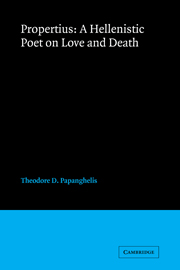Book contents
- Frontmatter
- Contents
- Preface
- Abbreviations
- 1 Introductory
- 2 nostris puer haesit ocellis: the lessons of 1.19
- 3 in amore mori: witches and lovers
- 4 in amore mori: the funeral
- 5 in amore mori: the shipwreck
- 6 in amore mori: crime passionnel
- 7 in amore mori: minor instances in Book 2
- 8 Strange beauty: a reading of 4.7
- 9 Concluding thoughts
- Bibliography
- Indexes
9 - Concluding thoughts
Published online by Cambridge University Press: 04 August 2010
- Frontmatter
- Contents
- Preface
- Abbreviations
- 1 Introductory
- 2 nostris puer haesit ocellis: the lessons of 1.19
- 3 in amore mori: witches and lovers
- 4 in amore mori: the funeral
- 5 in amore mori: the shipwreck
- 6 in amore mori: crime passionnel
- 7 in amore mori: minor instances in Book 2
- 8 Strange beauty: a reading of 4.7
- 9 Concluding thoughts
- Bibliography
- Indexes
Summary
Concentration on Liebestod must not obscure the fact that it is not only in the company of love that death stalks the Propertian oeuvre. This distinction is of importance, for by directing attention to the more general question of the poet's preoccupation with death it may point to some of the reasons for which the latter came to be so intimately involved in the language of love. Now the psychoanalyst tempted to step in at this point will soon find that he has simply not enough information to reconstruct a case history. We may well imagine the impact the death of a kinsman in the Perusine War of 41 b.c. (see 1.21 and 22) as well as that of his father (see 4.1.127–8) must have had on an impressionable child, but this is not much to go on. It is, perhaps, the historian who can make a better case, for the scars on the national psyche are amply documented. Boucher has given the historical and social background to the poet's ‘sentiment de la mort’ with economy and precision that cannot be bettered here: ‘Ce sentiment apparaît alors chez les contemporains de Lucrèce, de Cicéron et de Virgile comme un sentiment italien profoundément ressenti’; such were the effects of uninterrupted internecine strife from the Gracchi to Actium. There may also be truth in the suggestion that it was this feeling against which Epicurean philosophy was mobilised at about the same time.
- Type
- Chapter
- Information
- Propertius: A Hellenistic Poet on Love and Death , pp. 199 - 216Publisher: Cambridge University PressPrint publication year: 1987



